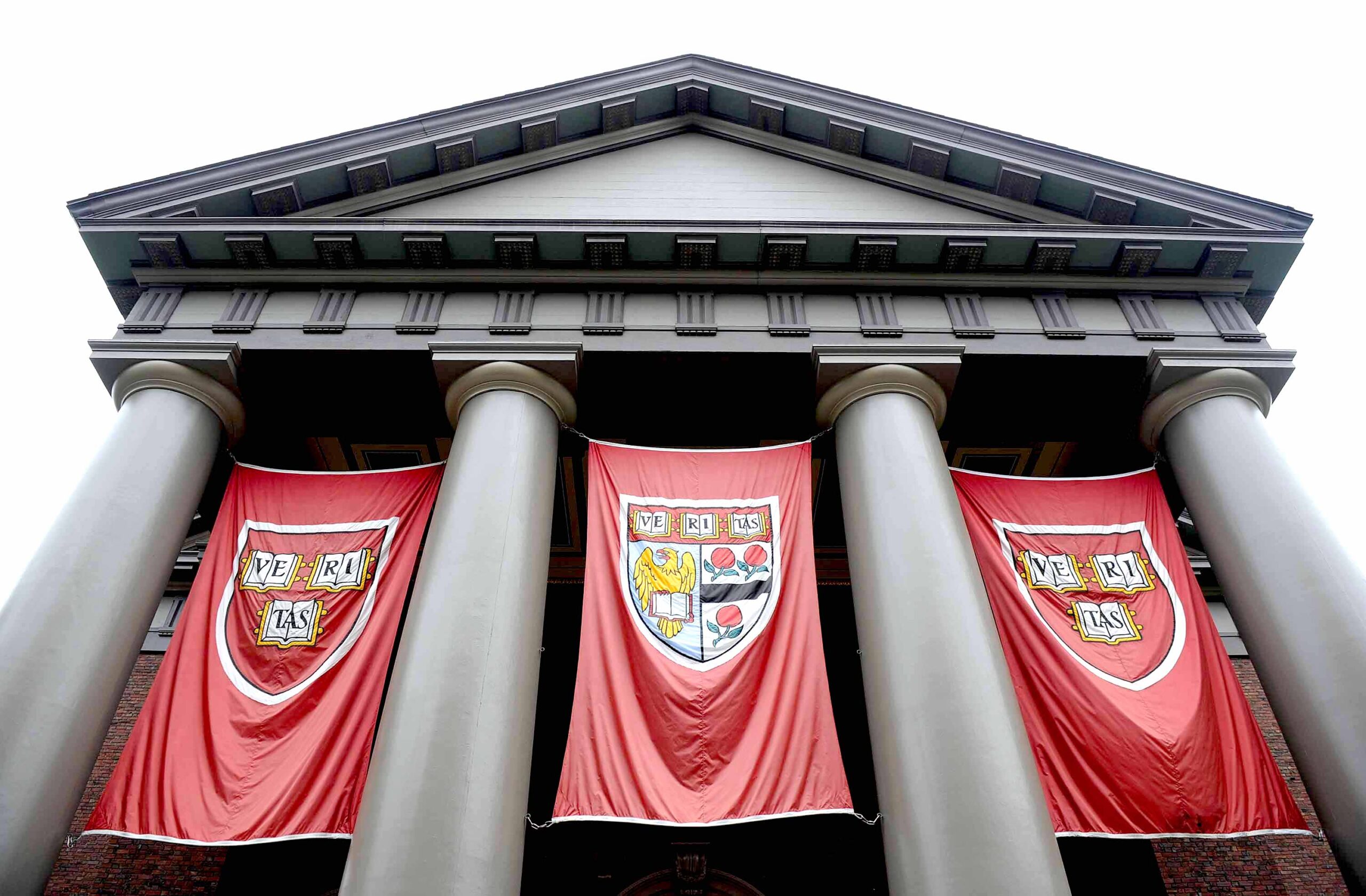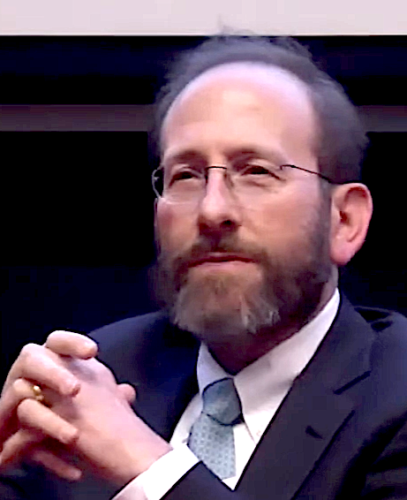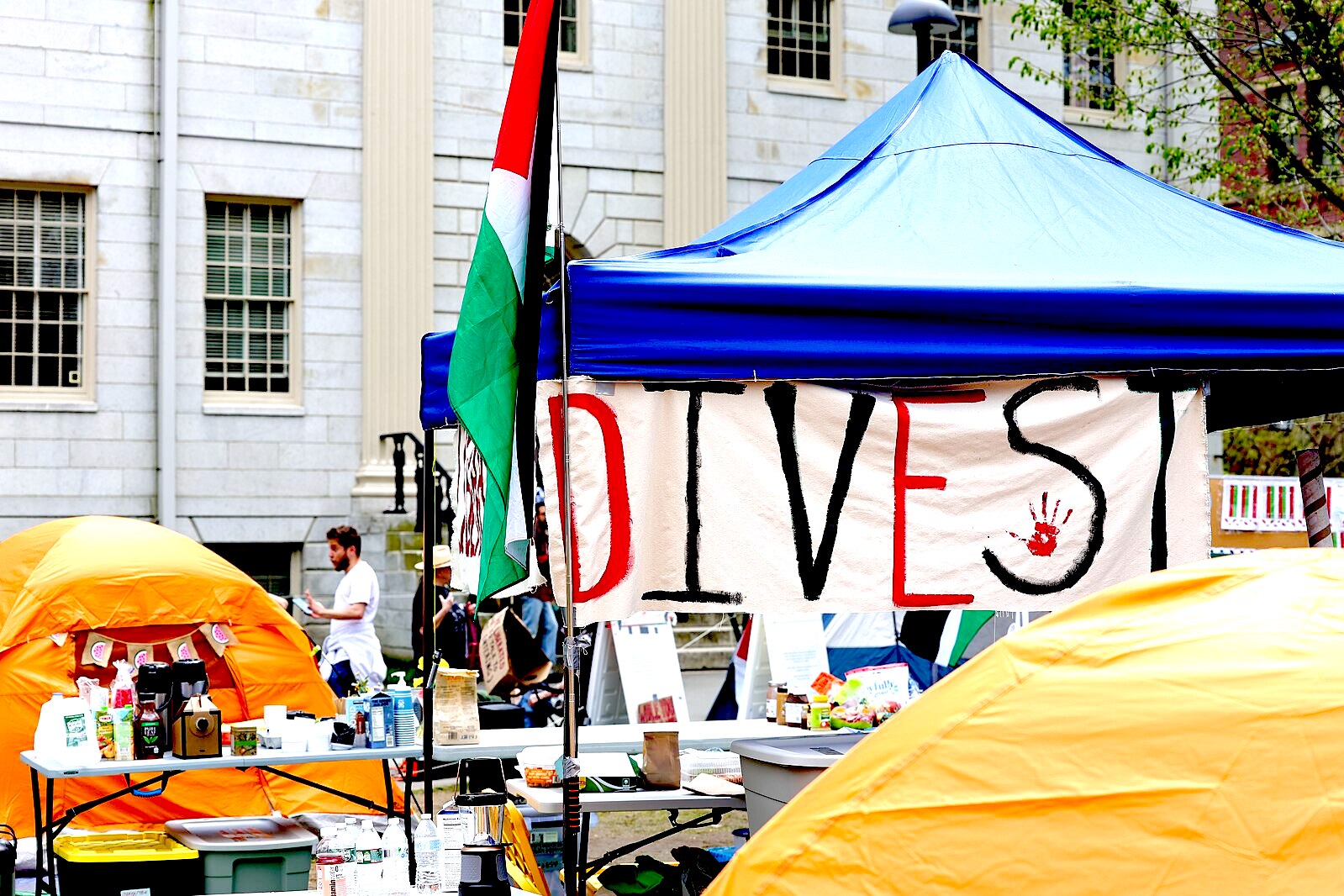Members of the university’s medical faculty call out the Harvard Corporation’s disproportionate punishment of 13 seniors for participating in the school’s Gaza solidarity encampment.

Harvard University banners on a building in the Cambridge, Massachusetts, campus. (PaWikiCom, Wikimedia Commons, CC BY-SA 4.0)
By Jennifer Brody, Alisa Khan and Lara Jirmanus
Common Dreams


 Across the country unrest continues to shake university campuses and commencement ceremonies. At Harvard, over 1,000 people walked out of graduation in a coordinated protest over its handling of students involved in the Palestine solidarity encampment.
Across the country unrest continues to shake university campuses and commencement ceremonies. At Harvard, over 1,000 people walked out of graduation in a coordinated protest over its handling of students involved in the Palestine solidarity encampment.
On May 14, after three weeks of peaceful protest, Harvard students dismantled their solidarity encampment based on assurances from Harvard President Alan Garber that disciplinary bodies would act “expeditiously under existing precedent,” with the goal that seniors would be able to graduate.
Garber led students (and faculty advisers) to trust that Harvard’s Administrative (“Ad”) Board, which enforces undergraduate academic regulations and conducts disciplinary processes, would be “guided by standard responses and considerations of equity.”
This, however, is not what happened.
The Ad Board placed 39 Harvard College students on multi-semester long probation and suspended five students. Consequently, 13 graduating seniors had their degrees delayed by multiple semesters. On May 20, the Faculty of Harvard College overwhelmingly voted to reverse the Ad Board’s decision and confer the 13 degrees.

Alan Garber in 2015. (HMS Center for Bioethics, Wikimedia Commons, CC BY 3.0)
However, on May 22, the day before graduation, the Harvard Corporation refused to let the 13 seniors graduate in a shocking rebuke to faculty governance.
These seniors may now lose post-graduate work opportunities and fellowships, including two of the 10 Harvard students awarded a Rhodes scholarship this year. These punitive actions will have lifelong consequences for students, many of whom are not from economically privileged backgrounds.
This disproportionate punishment exemplifies the “Palestine exception” by overturning decades of precedent in university disciplinary proceedings in prior student protest encampments — including many that were longer, larger, and more disruptive.
Far from responding in a “content-neutral” manner to Palestine solidarity protests, the university has shown that Palestinian lives — and the rights of those who advocate for them — are expendable.
Even before the student encampment, the ACLU of Massachusetts sent a letter to Harvard’s general counsel, warning that Harvard’s probation and suspension of the Palestine Solidarity Committee, the only recognized student Palestinian advocacy organization at Harvard College, “constitutes a breach of contract, violates Harvard’s duty to provide basic fairness in disciplinary proceedings, and may otherwise be unlawful because of its negative impact on free speech and associational rights.”
In the letter, the ACLU urged Harvard to “ensure that students expressing views that may be unpopular or controversial… are not disproportionately targeted due to their viewpoints.”
As physicians and faculty at Harvard Medical School, we have dedicated our careers to caring for vulnerable people. We teach our students the importance of standing up for the oppressed, that no life is disposable, and that we must use our privilege as physicians to contest conditions that devastate health and crush life chances.
While we each come from different faith traditions — Christian, Jewish and Muslim — we teach our own children the same thing. Do the right thing, no matter what others are doing. Speak out when others are being harmed.
We see clear connections between our healthcare worker colleagues in Palestine — who refuse to leave their patients’ sides, even as bombs fall and they become targets for detention and torture — and student protesters.

Harvard University Free Palestine Encampment on May 2. (Dariusz Jemielniak, Wikimedia Commons, CC BY 4.0)
On April 24, when students launched their encampment demanding an end to Harvard’s silence and complicity with genocide, students knew they risked their careers, livelihoods, and possibly even their physical safety.
Our students had already witnessed other university administrators, at University of Texas and Emerson College in Boston, call in police to violently remove encampments and arrest protesters.
Our students still made the principled decision to risk their education, careers and personal safety, as privileged students at Harvard, to demand justice for the people of Palestine. There were no universities left in Gaza, students reminded us. This collective act of solidarity was so inspiring, that each of us brought our own children to witness the encampment.
We wanted them to see and feel the love and principled commitment of young people in the encampment in the face of injustice. We wanted them to catch a glimpse of other worlds that might be possible. Worlds where all lives are held precious.
How will we tell our children of the unfair punishment students face at the hands of Harvard administrators for peacefully and bravely living their values, for daring to demand justice and an end to genocide? What should we now teach our students? That you may speak up, except for Palestine.
That Harvard resolved the Palestine solidarity encampment without police force has been framed as a victory for the Harvard community — a sign of its beneficence and tolerance.
But, if Harvard allows students to suffer the harsh and unfair consequences meted out by a body of 12 unelected members of Harvard Corporation — despite calls of over 500 Harvard faculty and staff and the vote of its own Harvard College Faculty — fundamental faith in the institution will disappear.
It would suggest that Harvard is not guided by its own principles of equity and fairness, but rather susceptible to corporate overreach and donor pressure. That too will have grave and long-term consequences that will long outlive the current students involved.
In the words of James Baldwin, “[We] do not believe what you say because [we] see what you do.”
Harvard could choose to repair broken trust. The first step is ending the Palestine exception and allowing our 13 seniors to graduate with degrees they earned.
Jennifer Brody, MD, MPH, is a primary care physician and assistant professor at Harvard Medical School.
Alisa Khan, MD, MPH, is an assistant professor of pediatrics at Harvard Medical School.
Lara Jirmanus, MD, MPH, is a primary care physician and clinical instructor at Harvard Medical School.
This article is from Common Dreams.
Views expressed in this article and may or may not reflect those of Consortium News.
Please Donate to the
Spring Fund Drive!



Those opposed to the odious influence of the Israel Lobby should not give up opposition and resign themselves to hopelessness about causing is downfall …… my suggestion — somehow getting the suppressed official findings of the USS Liberty investigation published and disseminated.
Upon learning the official truth about the treacherous Israeli attack on the clearly-marked ship and the unsuspecting sailors and murdering many of them, together with how the influence of the Israel Lobby caused the cancellation rescue jets mission, the outrage about the treachery of its “ally’ and the reason for the succumbing of the President with respect to the rescue jets mission would be of such a magnitude as to obliterate the power of the Lobby and to forever destroy the ‘Special Relationship’.
Harvard ‘Corporation’?? Huh? So they sold their soul then….? Are they a subsidiary of Phoenix University now? Do they pay their shareholders big dividends from their legendary endowment fund?
This is the culmination of the slow steady corporate takeover of the US and the collective West. It’s true face, despite all the friendly PR adverts is fascism. Just as Mussolini described.
There goes any chance of earning tenure at Harvard for the three assistant professors who authored this article, but I think they know that.
Civil rights in America continue to be eroded, in spite of all the social movements and new laws advertised to protect such rights. All this has been aided and abetted by the unrelenting corporatisation, now even of the hallowed halls of academe. The “Harvard Corporation,” not the Harvard Faculty is now the final word and authority on your fate after many long years (up to in excess of a decade for many doctorate programs) of jumping through all their hoops to earn the degree and whatever ancillary credentials you contracted to be awarded when you accepted admission into your specific program. How and why did that usurpation take place, I daresay under the radar?
Don’t the people in the highest echelons of power realise that they are not helping Jews one iota by confabulating accusations of “anti-Semitism” against anyone who would make any commentary on the clearly onerous and blatantly non-democratic actions of the Israeli state (be they against Palestine, Iran, Lebanon, Syria, Iraq, Yemen, or protesting Harvard students) and then bringing down the wrath of God, using all the weapons of corporate power, upon these poor, unsuspecting, well-intentioned souls. The entire West seems to have opted for total self annihilation, when its deliberate unrelenting clash with Russia is coupled with the madness it has perpetrated across the Middle East. They seem intent on crucifying the last sane world leader, recipient of endless American-led provocations, in the form of Vladimir Putin.
Are their actions really any surprise? It is right there in their name, or its name, “Corporation.”
Land of the Free and the home of the brave.